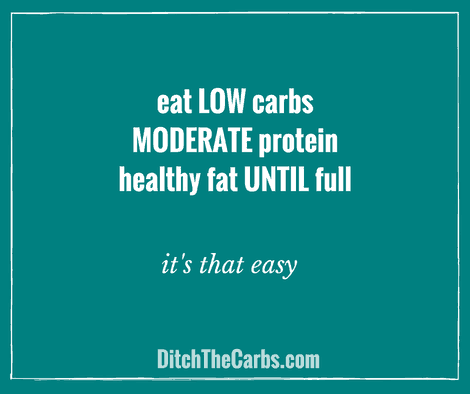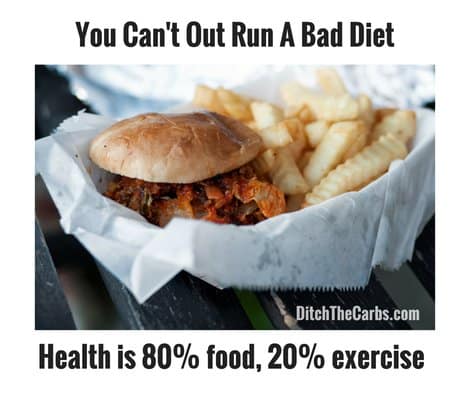The phrase “everything in moderation” is meaningless!
Why is it repeated so often and what does it actually mean? Most people use this valueless phrase to justify eating junk food on a regular basis.
Did you know that you are actually healthier by eating a small range of healthy foods, than everything in moderation?

Everything in moderation is terrible advice
Do we need a varied diet? – YES but do we need to eat everything in moderation – NO. This is a subtle, yet incredibly important point to distinguish.
Eating a varied diet can be done correctly or incorrectly. Eating a variety of whole unprocessed foods is perfect, eating a variety of processed food, unhealthy oils, processed carbs and nutrient-void food, is simply unhealthy.
“Americans with the healthiest diets actually eat a relatively small range of healthy foods,” he said. “These results suggest that in modern diets, eating ‘everything in moderation is actually worse than eating a smaller number of healthy foods. Forbes “
What To Eat?
Spoiler alert – eating a salad on Mondays and doing some exercise does NOT undo a bad diet.
Aim to include a variety of good quality proteins, vegetables, and enjoy only healthy fats, not a variety of calories from the bakery, soda aisle, snack aisle and candy aisle.
Even though “everything in moderation” has been advised for decades, it has never ever been defined or quantified. It is virtually an urban myth.
Everything In Moderation – the studies
And how does a diverse diet of everything, impact peoples intake of processed food?
By eating a diverse range of everything, allows an individual to overeat both healthy and unhealthy food in excess, leading to increased weight and larger waist size.
Eating healthy food simply does not cancel the effect of unhealthy food. And overeating then visiting the gym does not undo the damage and inflammation that junk food causes.
Everything In Moderation – an easy way to gain weight!
This study shows that those who have a diverse diet, actually put on weight.
“greater diversity leads to increased intakes of both healthier and unhealthy foods. Thus, potential benefits of increased intakes of fruits and vegetables may be outweighed by unfavourable effects of trans-fat, sodium, starch and refined carbohydrates, resulting in no overall benefit to metabolic health.”
In fact, this article shows
“scientists discovered that those with the most diet diversity had a 120 per cent higher waist circumference than those with little diet diversity.”
“Having more options can lead to eating more of those options,” she says. “If you’re exposed to a wide range of foods that are not that great for you, it can lead to increased intake.”
Everything In Moderation – a “get out” clause?
By following the advice “everything in moderation” allows people permission to eat processed foods at regular intervals. It condones a variety of foods from the bakery. It vindicates eating a variety of foods from the snack aisle and a range of fizzy soda drinks.
The authors of the study concluded
“An unexpected finding was that participants with greater diversity in their diets, as measured by dissimilarity, actually had worse diet quality. They were eating less healthy foods, such as fruits and vegetables, and more unhealthy foods, such as processed meats, desserts and soda,” said Otto. “This may help explain the relationship between greater food dissimilarity and increased waist circumference.”
“Our results challenge the notion that “eating everything in moderation” leads to greater diet quality or better metabolic health. Our findings support the importance of diet QUALITY, independent of diversity”
Everything In Moderation – worse for metabolic health!
In conclusion, they commented,
“Our findings suggest that, in US adults, eating “everything in moderation” may be worse to metabolic health than eating a smaller number of healthy foods.”
And of course, we want to eat a variety of healthy foods to ensure we obtain all the nutrients and vitamins our bodies require, and to avoid food boredom. So in fact, maybe the advice should be “eat a diverse diet of unprocessed food” and let us once and for all throw “everything in moderation” in the bin where it belongs.

“Our findings showed that people with greater diet quality, had nearly 25 per cent lower risk of developing diabetes after 10 years,” she says. “This suggests that eating a range of healthy foods may be more effective in promoting metabolic health than ‘eating everything in moderation.”

What do you think? Is moderation of junk food a good thing? How do you quantify moderation? Daily? Weekly? Monthly?
Leave your comment below –
Get our FREE guide to finally fix your metabolism!
Losing weight & getting healthy is never easy, but lately you might feel like it’s suddenly become impossible.
Our Flip the Switch guide will help you clearly understand what’s been going on, as well as exactly what you can do to get your metabolism working again so that you can look and feel your best—it’s easier and more simple than you think!











My biggest problem with ‘everything in moderation’ is that it is so vague. I’ve seen people successfully follow a moderation idea – but only because they were able to narrow down specific rules for themselves.
I agree. It is an excuse to not focus on a better diet. For me that statement means that if I have a slice of cake at an occasional party, or some juice or diet soda, it is not a death wish. My diet is clean, unprocessed, lower carbs 90 to 95% of the time.
I think the problem is you’re misunderstanding the phrase. It doesn’t mean, “eat a moderate amount of every food there is”, it means don’t eat an excessive amount of whatever you eat.
And that is exactly the nuance that no once understands – everyone seems to take away the message (helped by the food industry advertising) that you can eat every-thing as long as it’s not in excess. I wish more understood it as you simply state – “don’t eat an excessive amount of whatever you eat.”
I started keto a few weeks ago and the pounds are melting off. Still have a lot to learn. My husband doesn’t believe in it, though. He believes that we can be free to eat whatever we want, but not to excess, and that no food cravings should control us. I have difficulties in explaining to him that it was precisely eating carbs which led to my sugar cravings. He thinks it is simply a matter of will power. (And he is extremely disciplined). But he does put weight on over time, definitely. He’s losing it at the moment, by eating a bowl of fruit and muesli with low fat yogurt in the afternoons, and a couple of pieces of bread with cheese and meat in the evenings. At weekends, he eats normally, and will even have bbq food, cake and ice cream etc. He does this to show me that it’s possible to be ‘balanced’, because he can do it. It may work for him, at least temporarily, but I know he’ll put on weight again, once he gets to where he wants to be. As far as I’m concerned, after so many yo-yo diets in the past, I never want to go back to living that way again. It seems to be a matter of how we think.
We all have a different carb tolerance, some can eat far more carbs than we can, and it won’t trigger their cravings or fat storage. For those of us who are carb intolerant (and probably insulin resistant) then the smallest carb meal will send our insulin levels soaring and trigger fat storage and cravings again. I too love LCHF and find my appetite (after 35 years of dieting) is finally under control. LCHF is also so incredibly liberating. I base all my meals on low-carb real food, I don’t count anything any more and I am no longer obsessed with every single meal and what I should/should not be eating. Stick to your guns, and if LCHF is working for you – bravo!
There is no moderation of junk food . Food is fuel and it’s going to be hard to undo what has evolved here. Candy and junk is celebrated at every holiday to seal the deal. And we are poisoning ourselves and creating health epidemics. I remember mom not buying candy and I would ask to have it for Halloween and we got it for Easter , valentines and Christmas . We have so much sugar now in smoothies , shakes, cereal, baked goods for breakfast it’s crazy . And it is impossible to not notice how over weight much of the American population is. I wish I could make some kind of impact to turn this around . I tell everyone I know without sounding crazy.
Have you heard of the term orthorexia?
Essentially, you are telling people to fully remove items from their diets otherwise they will overindulge. That implies that that food is “dangerous” and we need to avoid it, which makes people afraid of foods. That is orthorexia my friend, and health is more than just food – it’s your emotional and mental condition too.
“Orthorexia is a term that was established in 1998 and refers to someone having an unhealthy obsession with healthy food. Someone with orthorexia might focus on clean eating, fad diets, ingredient lists, and food planning to the point where her health starts to suffer.” We are not a fad diet, all we do is stop sugar, grains and unhealthy oils. If it seems extreme to quit junk food, sugar and processed food, then there is something wrong with our food supply and food guidelines! Everything in moderation is a get-out clause for so many people to justify bad eating, from a variety of sources. If eating whole foods, quality protein, quality fats and nutrient-dense carbs is wrong, then crikey, please tell the millions I have helped regain their health and reverse some pretty serious conditions they need to go back on the junk food. As a pharmacist, I have seen first-handed for 25 years the effect of the low-fat guidelines and the wholegrain myth in my patients. It’s an absolute travesty that outdated science and outdated dietary policies are still being touted as the answer to health. No one here is afraid fo food, no one has ever said that. Living on whole foods is the most freeing, liberating, intuitive way to eat and live our best life 🙂